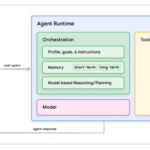The coordination of multiple agents represents a significant advance in the use of language models. In the current discussion about innovative AI applications, the orchestration of agents makes a key contribution to increasing efficiency in the intelligent automation of complex tasks.
Agent structure and example applications
Each agent has a specific name, a unique prompt, and a set of tools to perform the tasks assigned to it. This architecture promotes a clear division of responsibilities and facilitates the management of conversations. To learn more about the underlying technologies, check out our article on AI agent tools and frameworks, which provides a comprehensive overview. Using a customer service agent as an example, the article illustrates the practicality of agent orchestration by systematically delegating routine tasks such as processing customer inquiries and handing over handoffs to relevant departments.
The role of routines and handoffs
Routines, which are defined as structured tasks in natural language, offer a way of converting complex tasks into units that can be processed step by step. In addition, handoffs enable a seamless transition between multiple agents without losing the context of the interaction. These processes are crucial for managing the complexity and dynamic nature of tasks.
Integration of modern tools and databases
The integration of vector databases such as Pinecone, Qdrant or Milvus significantly increases the performance of these agent systems by allowing relevant information to be retrieved and assigned efficiently. Frameworks such as LangChain complement these systems by providing tools for the management of language model chains, thus further increasing the flexibility and adaptability of the agents.
Context preservation and API usage
Preserving the context of the conversation is a key element in the handover between agents. To this end, the guide recommends using a central system to document the conversation history to ensure that all agents involved always have the necessary information. The use of the OpenAI API illustrates how agents can be defined and handoffs can be managed.
The most important facts about the update
- AI-driven agent orchestration improves the efficiency of complex tasks.
- Routines and handoffs enable finely tuned management of multiple agents.
- The OpenAI API supports the seamless implementation and management of agent systems.
- Vector databases and LangChain extend the functions and applications of agent systems.
This innovative concept of agent orchestration offers exciting and versatile possibilities for improving intelligent division of labor and automation in AI. This opens up ways for developers to make demanding workflows even more efficient.
Sources: OpenAI







